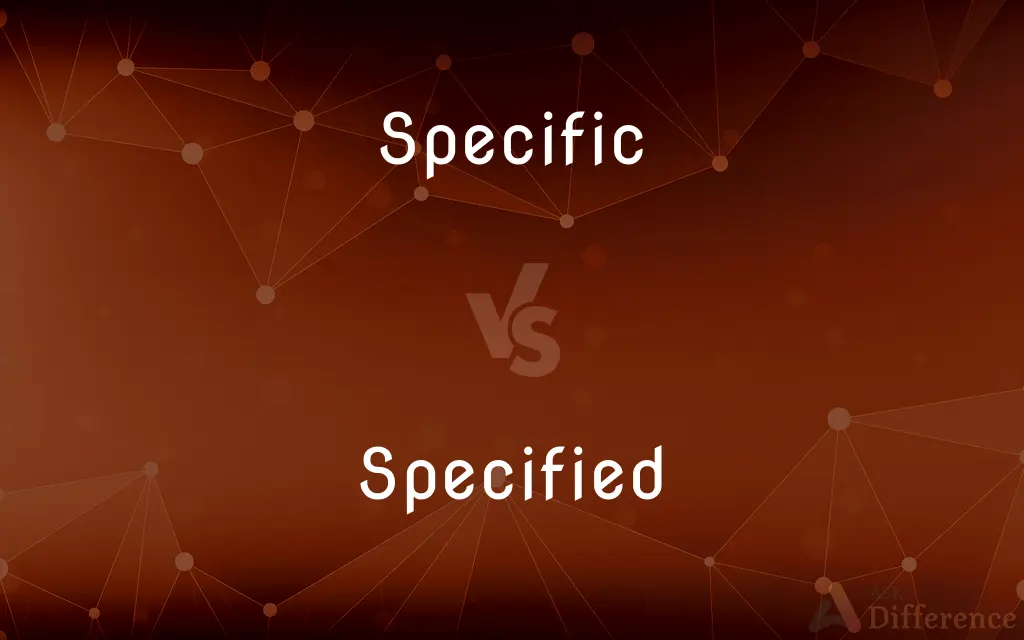Specific vs. Specified — What's the Difference?
By Tayyaba Rehman & Urooj Arif — Updated on April 8, 2024
Specific refers to something clearly defined or identified, focusing on particular details. Specified means something that has been clearly identified or stated as part of an agreement or document.

Difference Between Specific and Specified
Table of Contents
ADVERTISEMENT
Key Differences
Specific is used to describe something that is clearly defined or detailed, often emphasizing the uniqueness or particularity of the subject. It is commonly used in contexts where precision and clarity about certain attributes or qualities are important. On the other hand, specified is a term used to refer to something that has been clearly stated, mentioned, or defined, usually in a formal or legal context. It suggests that the details have been explicitly laid out, often as part of a contract, requirement, or instruction.
In scientific research, being specific about variables, methodology, and results is crucial for reproducibility and clarity. Researchers aim to be as specific as possible to avoid ambiguity. Whereas, in a legal contract, terms and conditions are specified to ensure all parties have a clear understanding of their obligations and rights, emphasizing the importance of explicit statements.
When giving instructions, being specific helps to avoid misunderstandings and ensures the desired outcome is achieved efficiently. For example, a recipe may specify the exact amount of each ingredient to use, ensuring the dish turns out as intended. Meanwhile, a construction blueprint will specify materials, dimensions, and placement, dictating the exact requirements for the project.
In everyday communication, being specific can help in conveying one's thoughts and needs more effectively, reducing the chance for misinterpretation. Whereas specifying something usually involves a deliberate action of identifying or stating something for a particular reason, often with a focus on formal or documented communication.
Specific knowledge or skills refer to those that are pertinent to a particular subject or field, indicating a deep understanding or expertise in that area. On the other hand, a job description may specify certain qualifications or experiences as requirements for candidates, delineating the precise criteria for eligibility.
ADVERTISEMENT
Comparison Chart
Definition
Clearly defined or detailed in nature.
Clearly stated or identified as a requirement.
Context
Broad, ranging from everyday language to academia.
Often formal or legal, such as in contracts.
Purpose
To provide clarity and precision.
To establish clear, formal requirements or conditions.
Usage
General description or identification.
Formal declaration or statement.
Examples
Specific instructions for a task.
Specified conditions in a contract.
Compare with Definitions
Specific
Pertaining to a particular thing.
He gave specific instructions not to touch anything.
Specified
Determined or designated.
The meeting time was specified in the email.
Specific
Clearly defined or identified.
She has a specific interest in ancient Egyptian art.
Specified
Stated clearly or described exactly.
The contract specified the payment terms.
Specific
Detailed and exact.
The scientist provided specific data on the experiment.
Specified
Set out or stipulated.
The guidelines specified the necessary qualifications.
Specific
Distinguished from others.
The policy applies to this case in specific, not generally.
Specified
Identified as a requirement.
The recipe specified one teaspoon of salt.
Specific
Clearly defined or identified
Savings were made by increasing the electricity supply only until it met specific development needs
Specified
Detailed explicitly.
The document specified all the conditions of the agreement.
Specific
Relating to species or a species
The differences between them can only be on the specific level
Specified
To state explicitly or in detail
Specified the amount needed.
Specified what was wrong with the program.
Specific
(of a duty or a tax) levied at a fixed rate per physical unit of the thing taxed, regardless of its price.
Specified
To include in a specification.
Specific
Of or denoting a number equal to the ratio of the value of some property of a given substance to the value of the same property of some other substance used as a reference, such as water, or of a vacuum, under equivalent conditions
Specific dielectric strength
Specified
To determine or bring about (a specific result)
A gene that specifies the synthesis of a single protein.
Specific
A medicine or remedy effective in treating a particular disease or part of the body
He grasped at the idea as though she had offered him a specific for cancer
Specified
Thoroughly explained. en
Specific
A precise detail
I wish I'd put more thought into the specifics
Specified
Simple past tense and past participle of specify
Specific
Explicitly set forth; definite
Wrote specific instructions.
Specified
Clearly and explicitly stated;
Meals are at specified times
Specific
Clear or detailed in communicating
Be specific when telling us what you need.
Specific
Limited, distinctive, or unique
Problems specific to small colleges.
Specific
Intended for, applying to, or acting on a particular thing
A specific remedy for warts.
Specific
Concerned particularly with the subject specified. Often used in combination
"age-specific voting patterns" (A. Dianne Schmidley).
Specific
Relating to, characterizing, or distinguishing a species
A specific name.
Specific
Designating a disease produced by a particular microorganism or condition.
Specific
Having a remedial influence or effect on a particular disease.
Specific
(Immunology) Having an affinity limited to a particular antibody or antigen.
Specific
Designating a customs charge levied on merchandise by unit or weight rather than according to value.
Specific
Designating a commodity rate applicable to the transportation of a single commodity between named points.
Specific
Something particularly fitted to a use or purpose.
Specific
A remedy intended for a particular ailment or disorder.
Specific
A distinguishing quality or attribute.
Specific
Specifics Distinct items or details; particulars.
Specific
Explicit or definite.
Specific
Pertaining to a species, as a taxon or taxa at the rank of species.
Specific
Special, distinctive or unique.
Specific
Intended for, or applying to, a particular thing.
Specific
Serving to identify a particular thing (often a disease or condition), with little risk of mistaking something else for it.
A highly specific test, specific and nonspecific symptoms
Specific
Being a remedy for a particular disease on a deeper level, rather than just masking the symptoms
Quinine is a specific medicine in cases of malaria.
Any improvement in secondary sciatica is probably due to the analgesic action of the sodium salicylate, but in primary sciatica, in all likelihood “rheumatic,” the effect of the sodium salicylate appears to be specific rather than symptomatic.
Specific
(immunology) limited to a particular antibody or antigen.
Specific
(physics) of a value divided by mass (e.g. specific orbital energy)
Specific
(physics) similarly referring to a value divided by any measure which acts to standardize it (e.g. thrust specific fuel consumption, referring to fuel consumption divided by thrust)
Specific
(physics) a measure compared with a standard reference value by division, to produce a ratio without unit or dimension (e.g. specific refractive index is a pure number, and is relative to that of air)
Specific
A distinguishing attribute or quality.
Specific
A remedy for a specific disease or condition.
Specific
Specification
Specific
(in the plural) The details; particulars.
Specific
Of or pertaining to a species; characterizing or constituting a species; possessing the peculiar property or properties of a thing which constitute its species, and distinguish it from other things; as, the specific form of an animal or a plant; the specific qualities of a drug; the specific distinction between virtue and vice.
Specific difference is that primary attribute which distinguishes each species from one another.
Specific
Specifying; definite, or making definite; limited; precise; discriminating; as, a specific statement.
Specific
Exerting a peculiar influence over any part of the body; preventing or curing disease by a peculiar adaptation, and not on general principles; as, quinine is a specific medicine in cases of malaria.
In fact, all medicines will be found specific in the perfection of the science.
Specific
Anything having peculiar adaption to the purpose to which it is applied.
Specific
A fact about some part (as opposed to general);
He always reasons from the particular to the general
Specific
A medicine that has a mitigating effect on a specific disease;
Quinine is a specific for malaria
Specific
(sometimes followed by `to') applying to or characterized by or distinguishing something particular or special or unique;
Rules with specific application
Demands specific to the job
A specific and detailed account of the accident
Nonspecific enteritis
Specific
Stated explicitly or in detail;
Needed a specific amount
Specific
Relating to or distinguishing or constituting a taxonomic species;
Specific characters
Specific
Being or affecting a disease produced by a particular microorganism or condition; used also of stains or dyes used in making microscope slides;
Quinine is highly specific for malaria
A specific remedy
A specific stain is one having a specific affinity for particular structural elements
Common Curiosities
Can something be both specific and specified?
Yes, information can be both specific (clear and detailed) and specified (explicitly stated) in certain contexts.
How do you use specific in a sentence?
You use specific to describe or refer to something clearly defined, e.g., "He has a specific skill set for the job."
How do specific and specified differ in legal documents?
In legal documents, "specific" details precise information, while "specified" refers to terms and conditions that have been explicitly stated.
What does it mean when requirements are specified?
When requirements are specified, it means they are clearly stated or laid out as necessary conditions.
How do you use specified in a sentence?
You use specified to indicate something that has been clearly stated or agreed upon, e.g., "The contract specified the delivery dates."
What does specified mean?
Specified refers to something that has been clearly stated, designated, or detailed, especially in a formal context.
How do specific details contribute to scientific research?
Specific details in scientific research provide clarity and allow for reproducibility and verification of findings.
What does it mean to be specific?
Being specific means providing clear, detailed, and exact information about something.
Why is being specific important?
Being specific is important for clarity, accuracy, and to avoid misunderstandings in communication.
Can specifications be vague?
Typically, specifications are intended to be precise and clear to avoid ambiguity, though poorly written ones can be vague.
How does specificity affect understanding?
Specificity enhances understanding by providing clear, detailed information that minimizes ambiguity.
What is the role of specified conditions in agreements?
Specified conditions in agreements clearly define the obligations, rights, and expectations of the parties involved.
What happens if something is not specified in a contract?
If something is not specified in a contract, it may lead to disputes or misunderstandings about the agreement's intentions.
Why might a job description specify certain qualifications?
A job description might specify certain qualifications to ensure candidates meet the necessary skills and experience for the role.
Is it better to be specific or broad in instructions?
It's generally better to be specific in instructions to ensure accurate understanding and execution.
Share Your Discovery

Previous Comparison
Numeral vs. Numerical
Next Comparison
Frightened vs. FrighteningAuthor Spotlight
Written by
Tayyaba RehmanTayyaba Rehman is a distinguished writer, currently serving as a primary contributor to askdifference.com. As a researcher in semantics and etymology, Tayyaba's passion for the complexity of languages and their distinctions has found a perfect home on the platform. Tayyaba delves into the intricacies of language, distinguishing between commonly confused words and phrases, thereby providing clarity for readers worldwide.
Co-written by
Urooj ArifUrooj is a skilled content writer at Ask Difference, known for her exceptional ability to simplify complex topics into engaging and informative content. With a passion for research and a flair for clear, concise writing, she consistently delivers articles that resonate with our diverse audience.















































